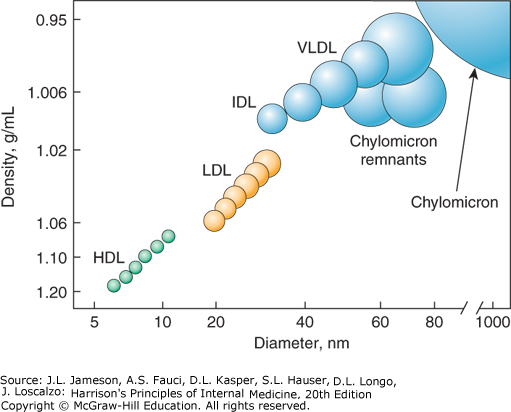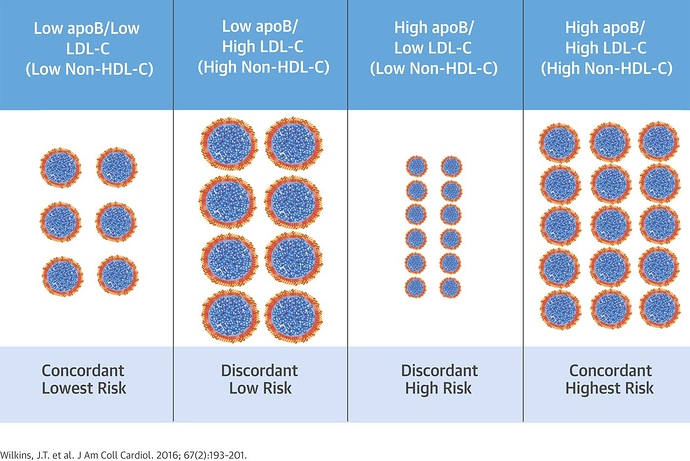I’ve been on Keto without a single day of straying for 6 months. I’ve educated myself about cholesterol as much as possible, but now that the lab results are in I’m still scared at the results. Here is what they are: Total 304, Triglycerides 69, Cholesterol HDL Ratio 3.9, HDL Cholesterol 78, Non HDL cholesterol 226, LDL 212 (WITH A BIG RED “HIGH” BESIDE IT), VLDL 14. I’ve studied that if LDL is big fluffy particles it’s a good thing, if they are small and dense it’s a bad thing. The problem is I don’t know what the size is. Can anyone tell me their opinion. My A1C was 5.2 and my estimated average glucose was 103. I don’t want to go off of Keto because adding sugar to my diet is not the answer. Any advice or hearing your experience will help. Thanks!
I just got my cholesterol tests back and I'm scared!
Can you get an NMR cholesterol Test to break down the LDL particle sizes and get a count?
Also, check out cholesterolcode.com … more useful content there than we could possibly tell you!
Tracy, in the context of a ketogenic diet the blood results look as expected.
It is normal to have increased low density lipoprotein numbers as your body uses your body fat stores for energy. The energy form of fats, the triglycerides, are transported by the LDL molecule to body tissues that need the fuel and cell wall maintenance parts, such as cholesterol for building cell walls.
If you have increased physical activity or fasted more than 14 hours before the test the LDL will be increased on that one particular blood test. LDL is a dynamic measurement and can vary a lot depending on factors that occur before a blood test. Including when you may have had your last cup of coffee or tea.
The VLDL (very low density lipoprotein) is the larger lipoprotein particle. The HDL (high density lipoprotein) is more compact. And the LDLs are inbetween.
 https://accessmedicine.mhmedical.com/data/books/2129/hpim20_ch400_f001.png
https://accessmedicine.mhmedical.com/data/books/2129/hpim20_ch400_f001.png
Well done on 6 months determined keto.
Listen to interviews with Dave Feldman regarding LDL investigation for concern on blood results.
Compare repeat blood tests, don’t worry too much over one result. If the concern is strong, research and retest. You can manipulate your LDL numbers by how you prepare for the blood test.
Why are you scared? What is the root cause of your worry?
To be100% honest here, as embarrassing as I am to admit it, I would say the root of my anxiety is being told by medical professionals that I’m doing something to harm myself. I was able to see my test results online and I have not talked to my doctor about it yet. I’m expecting him to give me the standard advice and to eat a diet low in saturated fats and cholesterol. In the last 6 months I have not had a single blood sugar spike and drop, which had become a major problem in my life prior to keto. I’m not a well spoken person and have suffered with anxiety my entire life. When I go to routine doctor visits my blood pressure sky rockets from anxiety. Doctors have a way of scaring me and it makes me think twice about deviating from anything they tell me.
That concern about doctors is enough to elevate blood glucose.
You’re dong fine. I also read in your post that the way of eating has benefited you.
Are you able to find a low carb friendly doctor in our area to support your health improvement?
Personally I think you’re numbers look healthy. On the particle size of LDL, since you’ve studied it a lot maybe you came upon the difference in how those two sizes exist. The larger fluffy particles are created mostly by consuming saturated fat. Small LDL particles are the result of metabolizing sugar and starches. On a ketogenic diet small particles should be drastically reduced and large particles increased. 
Typically Pattern A (large, fluffy LDL) is associated with low triglycerides and is healthier. Your triglycerides are very, very low, so that suggests Pattern A. That suggests that “high” LDL is not a significant risk factor here.
Also, your TG:HDL ratio is less than 1. That’s really low. Optimal is less than 2 so that’s very solid.
(IANAMD/IANYMD)
I haven’t spoken to my PCP yet about the results. If he has anything negative to say about the LDL being high, I’m going to bring this up to him. I know there’s a test that can determine the particle size, but I don’t know if he will be interested in ordering those tests.
Long story short, I had gastric bypass 15 years ago. I’m 5’ 3" and got up to 285 lbs. Today I’m 130 lbs. In March I developed a GI issue where I got extremely bloated every time I ate. I saw a specialist to make sure nothing was wrong with my gastric bypass. It was that specialist who suggested I go on a Keto diet. My stomach issue cleared right up after starting Keto. (I have a feeling I had a gluten sensitivity which caused the bloating.) Since I had never had a doctor tell me to eat high fat I asked him about cholesterol. He said you have to look at patterns and particle sizes. So to answer your question, I do have a doctor who supports Keto, but he’s not my PCM. I’m still waiting to see what my PCM says about my LDL. I’d like to have a good argument IF he tells me 212 LDL is not acceptable. I just wish lab work didn’t have big red letters screaming “HIGH” next to numbers.
Wow! You must feel like a different person, going from 285 to 130. I’m glad keto is helping you, and I feel for you on the test anxiety. I hate seeing the red marks, too. The whole experience of dealing with doctors is so anxiety producing. I’m always so relieved after an appointment.
LizEllen - I don’t regret my gastric bypass and I’m grateful every day. I know many bariatric patients gain a lot of their weight back and I’ve never forgotten how I felt being nearly 300 pounds. You are right about doctors and the anxiety they produce. It helps to get support and advice from forums like this one :-). I just listed to Dr. Ken Berry’s Youtube video on cholesterol and it sure relieved me.
Hi –
Your triglycerides, HDL and A1c are great. The LDL is high, but that might be a reflection of what your body is burning for fuel.
I’m curious what these numbers looked like before, it would give us better context of how keto/low carb is working for you.
If the primary care doctor follows the standard of care, with an LDL over 189, I think? (Someone will correct me), they will prescribe you a statin to lower the cholesterol.
It is good to collect knowledge to understand and accept the prescription, if offered, but then you decide what to do with that docket.
A primary care doctor may not have enough time available to unpack the context of nutritional ketosis and its benefits to your health. And everyone’s blood glucose goes up if an argument ensues.
Yep, she will be looking at the HIGH writ in red and seeing it as a thing to fix.
- I like to distract my doc by walking in the room and asking if I can weigh myself on his fancy scales as I don’t have any at home. Then I ask him to take my blood pressure twice. Then in the few minutes we have to talk about the blood test I deliver a list of tests I want him to order; things like fasting insulin, hsCRP, rbcMg. Then he points at the high LDL and I say I’ll eat more avocados and fish, so we should look for changes in the LDL next test (I monitor 6 mthly). I leave the visit with a customised blood test form and no prescription. I chose this doc because he is overweight and middle aged, he is tired and quite happy to be directed. I’ve been seeing him for about 2 years. He’s an ok diagnostician, but yet to ask me a direct question about what I eat.
Tracy, your numbers look great to me. If pushed to take a statin, ask for a prescription to get a CAC scan (coronary arterial calcification). Warning: you may have to pay for this yourself. If so, shop around, as the prices are all over the map.
The CAC scan will give you a score of calcification of the arteries. That score correlates relatively well* with risk. Also, if you get a low score, I can provide a study that shows statins do nothing for people with low scores.
*If you get a low score, you have low risk of heart disease. However, the risk is not zero and I have seen reports on Twitter where people still had heart disease with CAC scores of zero. That’s a very low risk, though. There are always exceptions to every rule, but the CAC scan is one of the only tools that tell actual risk.
Hmm…That was supposed to be an asterisk and not indented. I’m not sure how to fix that.
You can edit your posts after the fact. Asterisk is kind of a special character (Used for formatting), so I tend to use numbered footnotes [1] rather than punctuation in markdown notation.
[1] like this
What I meant was relatively well* = the stuff in the indented paragraph. That is, the asterisk is used to point to the paragraph (now indented) to explain more about what “relatively well” means.
Maybe I should just get rid of the asterisk(s) all together?
Congrats! In only 6 months you are a borderline “lean mass hyper responder”. It took me nearly 3 years of keto and high intensity strength training to join the club with my most recent lipid panel of
Total Cholesterol 327 Triglycerides 70 HDL 93 LDL 220
https://cholesterolcode.com/lmhr/
It’s not yet entirely clear whether this is good, bad or ugly but I’m increasingly inclined to think it is good. When my primary care physician suggested I book an appointment to discuss treatment options for my out of range results I pointed out that my triglycerides to HDL and TC to HDL ratios were good as were all my other numbers and I have zero interest in taking statins to lower LDL, drugs with known serious side effects of increasing the risk for diabetes and causing myalgia and myopathy, without clear evidence that I am both developing heart disease and that statins would actually slow it. As best as I can tell by tracking physical performance, pulse and blood pressure my cardiovascular health is improving. My doctor has dropped pushing statins for now.
http://www.thincs.org/ is an excellent place to find info challenging the pharmaceutical industry’s campaign to demonize LDL.

